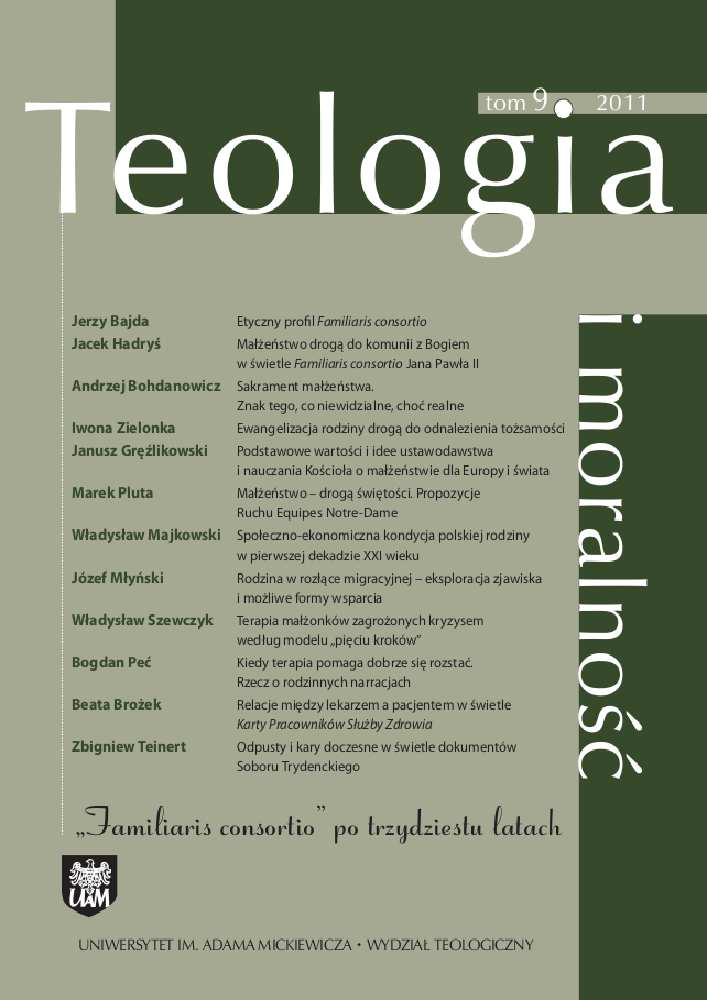Abstract
The article focuses on the ethical aspect of Familiaris consortio against the backdrop of a range of pastoral issues. The ethical question that accompanied the publication of this document stemmed from the hesitations and expectations triggered by a strong opposition to the teaching contained in the encyclical Humanae vitae of Paul VI. The exhortation does not directly engage in controversy with the opponents of the teaching of the Church, but offers a positive presentation of the entire body of teaching on the vocation of marriage and the family. In this document, vocation is a basic theological-moral category that explains and justifies the essential moral demands of marriage and the family and puts human life on the level of sanctity. This vocation has its source in God's plan of salvation and is revealed together with the accomplishment of the work of salvation in Jesus Christ. The mystery of this vocation is present in the history of mankind as concealed and at the same time revealed in the mystery of Christ and the Church. This vocation sheds significant light on the creation of man and woman, which is the creation of the family based on the foundation of marriage. Hence anthropological truth has a sacramental dimension. This vocation, while permeating internally the created reality, places in the very depth of being the insuppressible calling „Family, become what you are" (FC, 17). God the Creator and Redeemer entrusted to humans - a man and a woman - the task to build a family by the power of the same Love through which the world and human beings exist; it is also the selfsame Love that the Son of God revealed on the Cross when He established a new order of creation. Since then the truth of human existence and the truth of love must be interpreted only in the light of the Paschal mystery. The calling which flows from the depths of the sacrament speaks by the power of grace in the heart of the married couple, in the heart of the husband and wife, who are called to love one another with the same Love that springs from the Mystery of the Cross. This concept of vocation that follows from the sacramental character of Christian existence is the key to resolving particular questions that might arise in the context of married life. The vision represented by Familiaris consortio is uniform and charismatic; it is both theological and anthropological because it pertains to the human being as a human being, not just a „human individual" ensnared by conjugal bonds. In Familiaris consortio there is one conjugal norm and one parental norm: it is always the same Love that flows from God's Heart and through the sacrament permeates the hearts of the spouses. That is why conjugal love is parental love, a love that is responsible for the sanctity of giving birth to life and thus for the sanctity of God the Creator and the dignity of the human being called to be born into the world. Conjugal love and parental love cannot exist without conjugal chastity. To all likelihood here lies the main cause of resistance to the teaching expressed in Humanae vitae. Familiaris consortio rejects any contraceptive manipulation by emphasizing the contradiction inherent in the contraceptive attitude not only with Divine Law but also with the essence of humanity. This stance is contained in the statement that between proper conjugal life and contraception there is not only a moral difference but also an anthropological one (FC, 32). This is a harsh but true judgment on the practice of contraception: all those who use contraception descend to a sub-human level.References
Bajda J., Soborowa debata nad małżeństwem w cieniu Specjalnej Komisji Papieskiej, -“Studia Pelplińskie” 2002.
Bajda J., Powołanie małżeństwa i rodziny, Łomianki 2010.
Scola A., Doświadczenie człowieka, Lublin 2010.
Eckmann A. (red.) Pisma św. Augustyna o małżeństwie i dziewictwie. Przekład i komentarz, Lublin 2003.
Jan Paweł II, Mężczyzną i niewiastą stworzył ich, Watykan 1986.
License
All rights reserved
